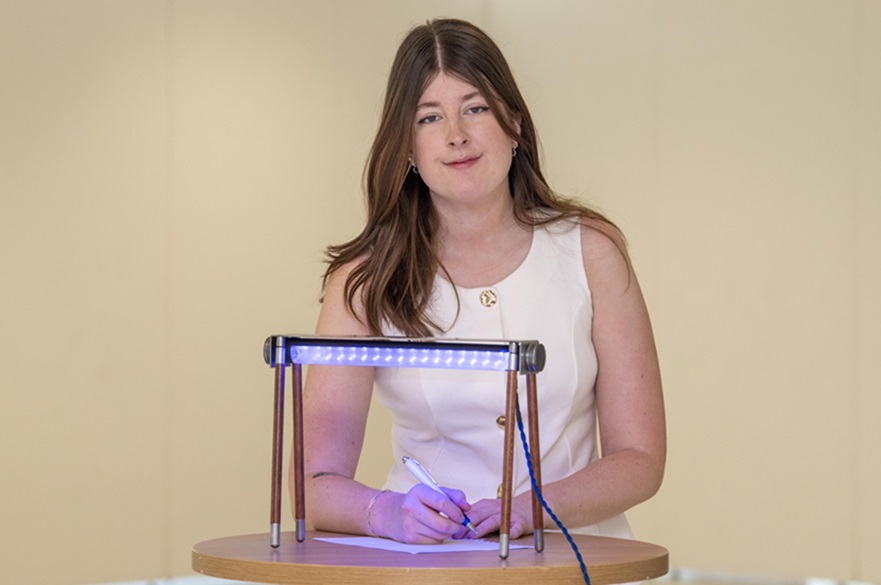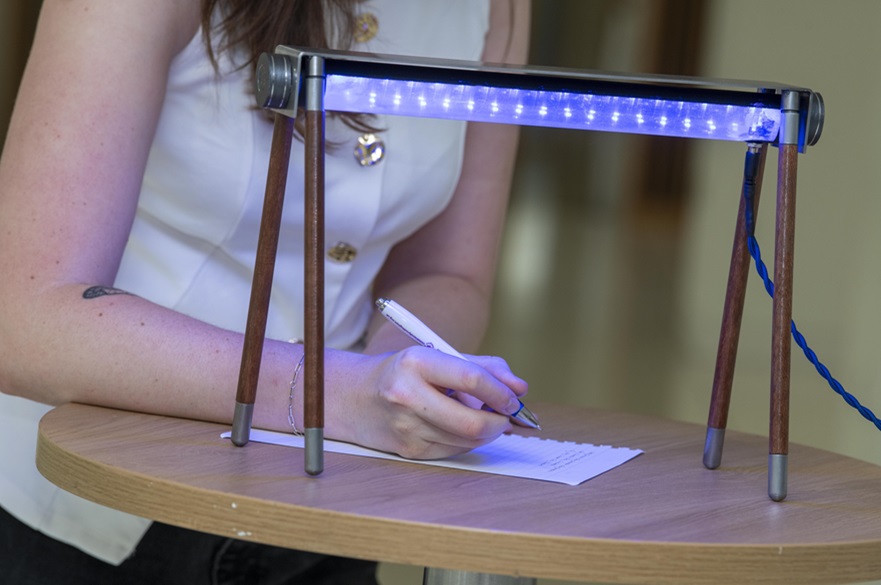Reading lamp that emits an array of colours to help people with dyslexia
By Chris Birkle | Published on 9 June 2025
Categories: Press office; School of Art & Design;

People with dyslexia and other conditions that affect perceptual processing could benefit from a new lamp which emits a variety of colours to help with reading.
Amy Simcock was inspired to create ‘Focus Glow’ following her personal experiences of Meares-Irlen syndrome, also known as visual stress, which is a condition similar to dyslexia that makes words appear jumbled on a page.
The Nottingham Trent University (NTU) undergraduate found that blue light helps make reading easier for her and wanted to create a lamp which emits a variety of colours to support other people’s varying needs.
The 22-year-old has always found limitations with other dyslexia-related reading products, such as blue overlays being impractical to use and blue-tinted glasses giving her migraines.
“I knew something was wrong when I was at secondary school and asked my friends if they were experiencing the same, but they weren’t,” said Amy, who is studying BA Product Design in the School of Architecture, Design and the Built Environment.
“It’s almost like you’re looking at a page and everything is jumbled around and moving. But as soon as you put that blue layer over the page, it calms it down and removes all of the noise.”

A close up of Amy's design
Focus Glow is a minimalist lamp which is mounted on stained hardwood legs to stand over a page on a desk with enough space for a user to read, write or draw beneath it.
It is fitted with 12 volt RGBW light emitting diodes (LEDs) with a rotator switch on one side which adjusts the colour to a person’s preferences, with seven colour options including red, blue, green, yellow, white, pink and orange.
A dial on the other side of the lamp adjusts the angle and direction of the light, and allows it to be turned away completely so it can be used as a mood lamp.
The casing is made from steel, with acrylic tubing and the dials are 3D printed, but could be casted.
“According to the British Dyslexia Association, an estimated 10 per cent of the population have dyslexia, so it’s amazing that there aren’t more products to support such a large amount of people,” said Amy, from Wantage in Oxfordshire.
“And that doesn’t even take into account the number of people who have visual stress and any other conditions that could benefit from this.
“So a light seemed the best answer, not least because it has the potential to be adjustable to suit a wide variety of people.”
Amy’s design is on public display until 12 June for the 2025 NTU Student Showcase, which one of the largest exhibitions of graduating art and design talent in the UK.
Max Pownall, Principal Lecturer in BA Product Design at NTU, said: “Amy has taken her personal experience of visual stress and demonstrated how there’s a huge gap in the market for a product like this which could benefit millions of people who have dyslexia and other similar conditions.
“Her project shows how simple design thinking has the potential to improve people’s lives by supporting them with a cost-effective solution for important everyday tasks such as reading and writing.”
Notes for Editors
Press enquiries please contact Chris Birkle, Public Relations Manager, on telephone +44 (0)115 848 2310, or via email.
Nottingham Trent University (NTU) has been named UK ‘University of the Year’ five times in six years, (Times Higher Education Awards 2017, The Guardian University Awards 2019, The Times and Sunday Times 2018 and 2023, Whatuni Student Choice Awards 2023) and is consistently one of the top performing modern universities in the UK.
It is the 3rd best modern university in the UK (The Times and Sunday Times Good University Guide 2023). Students have voted NTU 1st in the UK for student employability (Uni Compare 2025)
NTU is the 5th largest UK institution by student numbers, with over 40,000 students and more than 4,400 staff located across six campuses. It has an international student population of almost 7,000 and an NTU community representing over 160 countries.
NTU owns two Queen’s Anniversary Prizes for outstanding achievements in research (2015, 2021). The first recognises NTU’s research on the safety and security of global citizens. The second was awarded for research in science, engineering, arts and humanities to investigate and restore cultural objects, buildings and heritage. The Research Excellence Framework (2021) classed 83% of NTU’s research activity as either world-leading or internationally excellent.
NTU was awarded GOLD in the national 2023 Teaching Excellence Framework (TEF) assessment, as it was in 2019.
NTU is a top 10 for sport (British Universities and Colleges Sport league table 2023).
NTU is the most environmentally sustainable university in the UK and second in the world (UI Green Metric University World Rankings, 2023).